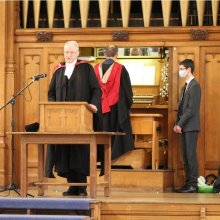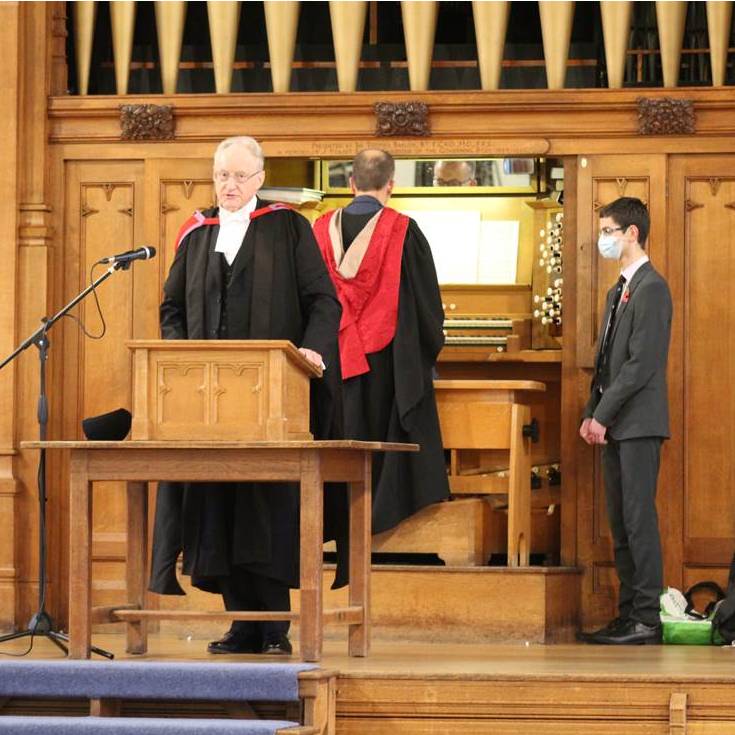
Despite Bolton School Boys’ Division’s Remembrance Assembly having to be conducted virtually for a second year, Dr Holland delivered another thought-provoking and fitting tribute to all those that sacrificed so much in the two World Wars.
All boys in the Senior School and Sixth Form joined parents and former pupils in watching the live broadcast, which saw Dr Holland reference the modern day plights of Coronavirus, conflicts in other parts of the world and climate change. He considered how memorial services had occasionally been called into question but concluded that they still attract thousands of people to the Cenotaph and to many other memorial ceremonies held around the world. He told how there had actually been renewed interest in recent years, citing the case of former soldier Brian Wood MC, who is currently undertaking a 635 mile marathon challenge – one mile for each British soldier that lost their life in either the Iraqi or Afghanistan conflicts.
Dr Holland took his audience back 80 years to 1941, focussing on the formidable threat in the North Atlantic of the German battleship, HMS Bismarck. Having destroyed Britain’s HMS Hood, the Bismarck was tracked down, 300 nautical miles off the west coast of France, and turned into a ‘fire-spinning monster’ and destroyed with the loss of over 2000 lives. The sinking put an end to the attacks on the British merchant fleet and encouraged Roosevelt to pledge unfailing American support for Britain’s vital supplies. The details of the battle, Dr Holland said, are well documented in Ian Ballantyne’s book ‘Bismarck: 24 Hours to Doom’.
Dr Holland then recalled seven former pupils who had lost their lives in conflict during 1941, drawing from Dr Eric Macpherson’s book ‘Remembered With Honour’. Gunner Raymond Preston Archer One Regiment the Royal Halls Artillery killed in action aged 24, Fireman Edward Aspinall Hitchon died on duty in Liverpool aged 33, Warrant Officer Class II (CSM) Geoffrey Sidney Houghton Intelligence Corps died in London aged 28, Sergeant (Pilot) Tyler James Bruckshaw 102 Squadron of the Royal Air Force killed in action aged 20, Sergeant (Wireless Operator/Air Gunner) Robert Lea Wharton of the 75 Squadron of the Royal Air Force killed in action aged 21, Sergeant (Pilot) Frank Armitage 10 Squadron of the Royal Air Force died aged 21 and Second Lieutenant Adam Greenhalgh Taylor of the King’s Own Royal Regiment (Lancaster) who died of wounds aged 27. Dr Holland paid tribute to those lost by reciting lines from the hymn 'O Valiant Hearts'.
Thoughts then turned to the Soviet Union in 1941 and Stalin’s plea for help from Britain and her allies. Dr Holland told how the assistance provided by the Royal Navy and the merchant fleet was one of their finest achievements; beginning with the first Arctic Convoy that sailed from Liverpool there were over 4 million tonnes of supplies delivered by 78 convoys to the Russians between 1941 and 1945. The fleet braved the German navy and some of the worst weather conditions imaginable – over 3,000 servicemen losing their lives.
Tribute was also paid to the Royal British Legion in their centenary year who give enormous support to the whole of the armed forces community. In November 1921 the first poppy appeal raised £106,000, nearly £30 million in today’s money. The symbolism of the poppy was memorably expressed during the First World War by the verses of John McCrae, who was struck by these blood red flowers springing up in a cemetery a few hundreds yards from Ypres. Dr Holland then eloquently read ‘In Flanders Fields’.
The School’s fallen were remembered with wreaths laid in front of the Memorial window by the School Captain Ali Ahmed, Vice-Captain Matthew Mair and Senior Monitor James Hopkinson. A two minute silence was impeccably observed by the whole School at 11.00am.
Watch the Remembrance Assembly in its entirety.























